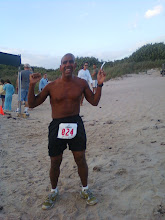The full quote by Bruce Lee to that young student in " Enter the Dragon " was actually " Don't think, feel. It's like a finger pointing to the moon" . And then he slaps the kid when the kid starts looking at the finger , telling him the finger is just a guide,and he'll miss " all the heavenly glory"!
Aside from the Zen like sound, that quote has practical meaning. For athletics the scientific term is proprioception. Basically it's a fancy way of saying to feel what you're doing. Getting a feel for what you're doing can really help your progress.It can also help to lessen the chance of injuries.
A good example is the 1 leg squat aka the pistol. First you stand on 1 leg. If you start to shake and wobble try to feel where and why. Often times your supporting leg may be caving inward, or maybe you're leaning backwards,etc. So rearrange your body until you feel stable ( head up, eyes up, spine over the ankle,etc). Then when you go down feel it again. Are you sitting backwards, are you moving from the hips, are your knees protruding way forward? Assuming you make it down, on the way up, feel if you pushed your whole foot, especially the heel, into the ground, are your glutes and hamstrings doing most of the work, are your abs braced,are you looking up or down at the floor? And of course, did you make it all the way up without shaking?
There are other ways you can feel if you're doing it wrong. Pain in the your tendons and nerves indicates something's wrong with your technique, which again could be because of a structural error ( landing on your heels or toes while running, scooping outwards while swimming freestyle, hunching over in a kettle bell swing, etc.). Sound can also be used. When you run for example, you want to land softly and quietly. If you're pounding loudly with each step there's something wrong with your stride. Again, you're probably landing on your toes or heel. If you hear a different type of splash in freestyle and butterfly stroke double check. You may slapping your palms first rather than your fingers.In certain lifts, like the clean as well as the snatch, if you've done it right the bar makes a clanking sound.
If you're technique is off, you'll often feel it in other areas. For example, if you lean from your head and chest when you run, you'll have neck and shoulder pain, as well as difficulty breathing. If you sink your head too much while swimming freestyle, you'll probably end up lifting your head straight up, or even if you turn to the side to breathe, you may end up with a mouth full of water because your head is too low in the water.When you clean a weight, if you lean backwards you could fall back. You get the idea.
While sound and feel are good ways to correct yourself , mirrors can often lead to problems, especially when lifting weights. Studies on Olympic lifters showed they often misjudged their distances and angles. Often times, guys look at the mirror rather than the weight ( or kettle bell,etc). I will say that while mirrors may not be good, I've had some good use out of "natural mirrors", namely shadows. Particularly, for running and swimming, although even here I try to feel the technique. Actually, what's better than a mirror, if you want visual feedback, would be a friend or coach to watch you and comment/correct you. Also very good, if it can be done, is have someone film you ( I know kind of tough on a long distance run !) and then watch and learn what needs to be done.
The winners aren't just gifted genetically, or practice harder than everyone else. They also practice smarter, and a big part of that is knowing what works through feel, and avoiding that which is harmful. So feel what needs to be done right and do it.
Wednesday, November 28, 2012
Subscribe to:
Post Comments (Atom)

No comments:
Post a Comment